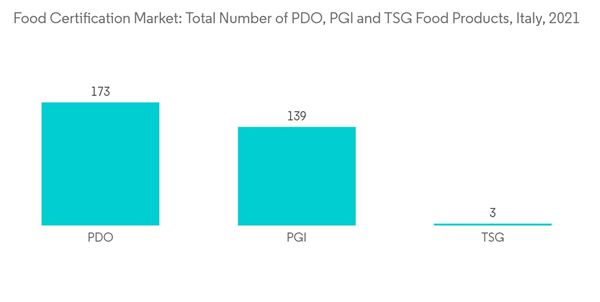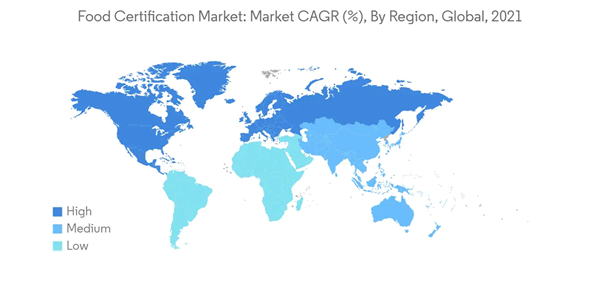The long-term growth of the TIC (Testing, Inspection, and Certification) market has been aided by an increase in corporate outsourcing of R&D operations as well as quality assurance work to third parties, increasing trade flows, and a growing global demand for regulation of materials, products, systems, and processes.
In recent years, the food industry has seen a rapid digitalization of food safety. Businesses began to use digital solutions to record food safety data more accurately, reduce human error, and improve overall compliance. The industry is only expected to embrace this trend more as new software programs and automated applications for food businesses hit the market.
Moreover, the rising concerns about artificial products around the world are driving the market significantly. Since consumers were more focused on the types of food they were consuming and were also mostly preferring the food products that were properly labeled. The properly labeled food products and the food companies certified by various agencies play a vital role in the consumer's preferences because of the food safety these products carry. Bureau Veritas, which is one of the major players in this industry, estimated an organic growth in fiscal 2021 in marine-based food products. The company had a growth of 8.7% in operation compared to the pre-pandemic situation.
Additionally, the major factors that are expected to drive the growth of the food certification market during the forecast period include increasing consumer awareness about certified food products, growing demand for processed meat products certification, and the rising prevalence of foodborne illness. According to WHO (World Health Organization) every year, one in every ten people in the world suffers from illness after eating contaminated food, and 420 000 die, resulting in the loss of 33 million healthy life. Each year, low- and middle-income countries lose USD 110 billion in productivity and medical costs due to unsafe food. Children under the age accounts account for 40% of the foodborne disease burden, with 125 000 deaths each year.
Food Certification Market Trends
Rising Awareness about Global Standards and Food Safety
Global standards are developed, adopted, and identified in several ways. For instance, they are contributing to market growth and even incorporating the protection of the environment, consumer health, and public safety of workers. The standards and regulations have started playing a vital role with an increase in private equity firms, and in turn, the global standard paradigm is evolving gradually.According to a survey conducted by ISO, in order to compile the number of valid certifications issued by certification bodies (accredited by members of the International Accreditation Forum), ISO 14001 (environmental management) grew by 8%, outpacing the threshold of 3,00,000 certificates, while 4,200 organizations have been certified to the new quality management ISO 9001:2015, immediately after three months from the published date. Thus, the globalization of standards is driving the overall market studied, and also, the training and inspection market.
Moreover, with changing dietary behaviors, the expansion of chain restaurants, and the globalization of the food industry, ensuring food certification is becoming increasingly essential. The need to improve food safety systems within and across countries is becoming more evident as the world's food supply has become more globalized. The public and private sectors are being compelled to adopt hygienic food production due to the increase in the global population and increased awareness of the cleanliness of food production. This is where the requirements of the food certifications come into play, ensuring that the food industry complies with the law.
North America is the Largest Market
In the North American region, the certification bodies, via follow-up and thorough audits, make sure that the companies engaged in food and alcohol production follow adequate food management processes. According to the Department of Agriculture of the United States (USDA), strict regulatory norms force manufacturers to comply with the regulations and continue to drive the market. The food industry is profoundly impacted by new FSMA rules and consumers demand greater transparency when it comes to food consumption. In 2022, the FDA finalized seven major rules to implement FSMA, recognizing that ensuring the safety of food supply is a shared responsibility among many different points in the global supply chain. This is expected to drive the demand for food certification.The United States led the North American market, owing to the growing health consciousness and consumer awareness of the side effects of adulterated food products in the region. Somerdale International, the leading importer of British cheeses and dairy products to the United States, has launched the first, fully-accredited, and non-GMO British Cheddar. The new “Westminster Sharp” has been accredited as non-GMO by NSF International.
Additionally, according to the Global Food Security Index, 29% of US consumers are most concerned about chemical contamination in food, and 26% are concerned about foodborne illness.
Food Certification Industry Overview
The market studied is a mature market. This is due to the presence of domestic and international players in the segment. Some of the major players in this market are Bureau Veritas, Eurofins Scientific, Intertek Group PLC, SGS Group, and NSF International. Most companies are actively involved in mergers and acquisitions, owing to globalization, and the leading global companies have a considerable share within the industry. The strategy behind mergers and acquisitions is also enabling these top players to sustain dominance over other regional players in the industry. For instance, In September 2021, Bureau Veritas acquired AET France, a France-based testing company, which provides product development and other testing services to consumers. According to the company, the major strategy behind this acquisition is to strengthen the company's core research and development sector with the expertise given by AET France. Thus, the company can acknowledge deeply about a specific product and can offer better service to the consumers.Additional Benefits:
- The market estimate (ME) sheet in Excel format
- 3 months of analyst support
This product will be delivered within 2 business days.
Table of Contents
Companies Mentioned (Partial List)
A selection of companies mentioned in this report includes, but is not limited to:
- TÜV SÜD AG
- Intertek Group PLC
- SGS Group
- Bureau Veritas
- Eurofins Scientific
- NSF International
- Compagnie Merieux Alliance SAS (Merieux Nutrisciences)
- SCS Global Services
- AsureQuality Limited
- Det Norske Veritas Holding AS










